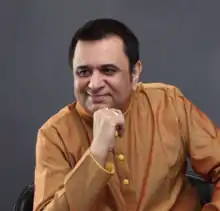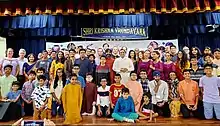Divyang Vakil
Pandit Divyang Vakil is an Indian tabla guru (teacher), composer and philosopher, commonly known as Guruji.
Pandit Divyang Vakil | |
|---|---|
 | |
| Website | divyangvakil.in |
Musical career
Pandit Divyang Vakil formally trained in classical tabla under three Gurus - Pandit Sudhirkumar Saxena of Ajrada gharana, Ustad Latif Ahmed Khan of Delhi gharana and Ustad Allarakha Khan of Punjab gharana.[1] Vakil has also accompanied many of the great masters of Indian classical music including Pt. Nikhil Banerjee and Pt. Maniramji.
Over 15 years ago, Vakil renounced his career as a tabla performer to dedicate himself wholeheartedly to teaching, composing and his spiritual practices.[2]
The Tabla Guru
In 2009, Divyang Vakil (affectionately known as "Guruji" to his students) completed his 30th year of teaching tabla. Vakil has taught hundreds of students in his 30 plus years of teaching journey.[3] He is the founder of Rhythm Riders Music Institute[4] in Ahmedabad, Gujarat. An affiliate institute of Rhythm Riders Music Institute is the Taalim School of Indian Music in the US, which is run by American disciples of Vakil.[5] Students of Vakil have also established tabla schools in places such as Australia, Korea, UK and the US.[6]
Awards
Vakil received 'Gujarat Gaurav Puraskar' (Gujarat State honour) by Gujarat sahitya Akademi on 8 December 2014 for his years of contribution in the field of classical music.
The Composer
Vakil is most well known for his contemporary classical tabla ensemble Tālavya. Through his compositions, Vakil has given a modern form to classical tabla playing.[7] Tālavya currently performs Vakil's latest group tabla composition entitled Tabla Ecstasy. His latest work, Pradhanica, is a kathak dance performance accompanied by a live world percussion ensemble. Previous group works include Tabla Tarkhat, Tabla Taandav, and Tabla Triveni.[8] In 2007, his tabla duet called Power of Tabla was the first musical performance by Gujarati artists to be performed in the history of IIM-Ahmedabad Chaos Festival.[9]
Vakil has composed several full-length instrumental ensemble pieces for the international stage. One of his most difficult works is Ardha Taal Chakra (literally meaning "circle of half rhythms"). Ardha Taal Chakra explored half-beat Indian rhythm cycles.[10] Created in 2006, it was recomposed and renamed in 2010 to become Ardha Taal Chakravyuha.
In 2011, he collaborated with South Korean musician Yu Kyung-hwa. Vakil composed a piece for Yu to play on the traditional Korean instrument, the Janggu, and set it to popular Indian rhythms. The piece debuted in February 2011 at Rhythm Riders Music Institute in Ahmedabad, India. The following month Vakil was invited to compose and teach Indian rhythms and theory to Korean artists in an international music exchange program.[11]
Events
References
- "About Tabla Guru".
- "High Energy Performance by Tabla Ecstasy Ensemble". Saathee Magazine: 36, 86. March 2010.
- "Rhythm Riders Music Productions". Retrieved 29 June 2011.
- Rhythm Riders Music Institute
- "About Taalim School".
- "About Founder". Archived from the original on 9 September 2012.
- "Taan and Talavya to Perform at Sports Club". Gujarat Samachar. 28 May 2011.
- "Talavya".
- "Taalnaad at IIM-Chaos". Gujarat Samachar. 26 January 2007.
- Kukadia, Sejal (3 June 2011). "Tabla Maestro: Pandit Divyang Vakil". News India Times. Archived from the original on 26 March 2012.
- "Profiling World Music Composer Pandit Divyang Vakil". Divanee.
- Dutt, Ela (24 September 2018). "Indian-Americans, others engage in 'Majestic Battle' between tablas and waterfall in New York". News India Times. Retrieved 21 March 2019.
- "8 - Ahmedabad Mirror, 7/18/2019". epaper.timesgroup.com. Retrieved 14 October 2019.
- "21 - Ahmedabad Mirror, 7/16/2019". epaper.timesgroup.com. Retrieved 14 October 2019.
